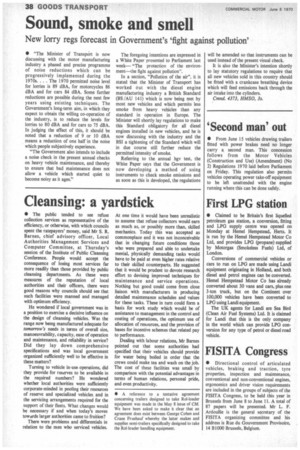Cleansing: a yardstick
Page 40

If you've noticed an error in this article please click here to report it so we can fix it.
• The public tended to see refuse collection services as representative of the efficiency, or otherwise, with which councils spent the ratepayers' money, said Mr S. R. Barnes, chief advisory officer, Local Authorities Management Services and Computer Committee, at Thursday's session of the Institute of Public Cleansing Conference. People would accept the consequence of losing most services far more readily than those provided by public cleansing departments. As these were measures of the reputation of local authorities and their officers, there were good reasons why councils should see that such facilities were manned and managed with optimum efficiency.
He wondered if local government was in a position to exercise a decisive influence on the design of cleansing vehicles. Was the range now being manufactured adequate for tomorrow's needs in terms of overall size, manoeuvrability, capacity, ease of operation and maintenance, and reliability in service? Did they lay down comprehensive specifications and was local government organized sufficiently well to be effective in these matters?
Turning to vehicle in-use operations, did they provide for reserves to be available in the required numbers? He wondered whether local authorities were sufficiently corporate-minded in pooling their resources of reserve and specialized vehicles and in the servicing arrangements required for the support of their fleets. What changes would be necessary if and when today's moves towards larger authorities came to fruition?
There were problems and differentials in relation to the men who serviced vehicles. At one time it would have been unrealistic to assume that refuse collectors would earn as much as, or possibly more than, skilled mechanics. Today this was accepted as commonplace and it was not inconceivable that in changing future conditions those who were prepared and able to undertake menial, physically demanding tasks would have to be paid at even higher rates relative to their skilled counterparts. He suggested that it would be prudent to devote research effort to devising improved techniques for maintenance and service operations. Nothing but good could come from close liaison with manufacturers in producing detailed maintenance schedules and values for these tasks. These in turn could form a basis for work study which would be of assistance to management in the control and costing of operations, the optimum use of allocation of resources, and the provision of bases for incentive schemes that related pay to performance.
Dealing with labour relations, Mr Barnes pointed out that some authorities had specified that their vehicles should provide for water being boiled in order that the crews could make tea and wash on the job. The cost of these facilities was small by comparison with the potential advantages in terms of human relations, personal pride, and even productivity.
• A reference to a tentative agreement concerning trailers designed to take Rol-loader equipment was made in the May 8 issue of CM. We have been asked to make it clear that an agreement does exist between George Cohen and Crane Fruehauf whereby the latter makes and supplies semi-trailers specifically designed to take the Rol loader handling equipment.




























































































































































































